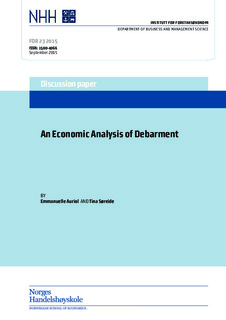| dc.description.abstract | With a view to reducing the consequences of corruption in public procurement,
many governments have introduced debarment of suppliers found guilty of corrup-
tion and some other forms of crime. This paper explores the market effects of
debarment on public procurement. Debarment is found to make little difference
in markets with high competition, while in markets with low competition it may
deter corruption as long as firms value public procurement contracts in the future
and there is a certain risk of being detected in corruption. On the other hand,
debarment { when it works { has an anti-competitive effect, and this effect will
contribute to facilitate collusion between suppliers. Debarment may work as a tool
against collusion, but only if targeting one firm at the time (such as a ring-leader or
the specific beneficiary when the collusion is detected) { and not all the members
of a cartel. If designed with an understanding of the market mechanisms at play,
debarment can deter both collusion and corruption, thus improving the results of
public procurement. If so, most current debarment regimes need modification. | nb_NO |
